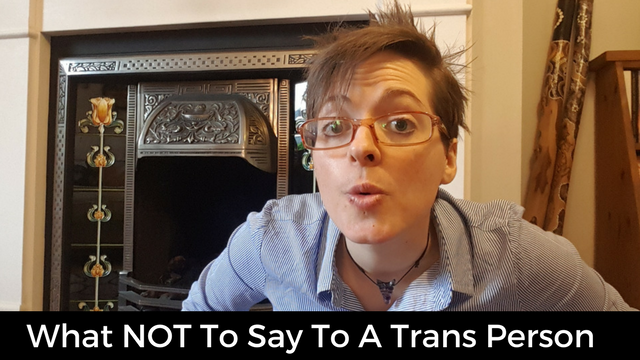When someone comes out to you as being transgender what is the best thing to say and how can you support that person?
After all, the last thing you want to do is cause any offence or upset them in any way.
There are 4 things you might say that can potentially cause offence.
Number One. Never refer to being transgender as ‘a choice.’ Being transgender is not a choice. You wouldn’t choose to live
your life in a way that risked you facing daily abuse, discrimination and prejudice. You wouldn’t choose to undergo gender reassignment surgery and the years of anxiety and distress that arises whilst you await your surgery. Coming out as transgender, transitioning and worrying about ‘passing’ everyday, that isn’t a choice.
Most transgender individuals describe an innate knowing that their gender identity differs from the one they were assigned at birth. Think of it like having a female brain in a male body or vice-versa. They have progressed through their life with people around them expecting them to be and act like a boy/girl, when inside they feel to be a girl/boy. Transgender individuals learn very early on in life to hide the true person they really are so they can fit in and be accepted.
Gender dysphoria causes extreme distress. The Stonewall School Report 2017 highlighted that 48% of transgender people under 26 years old have attempted suicide and 59% have considered doing so. More than four in five trans young people have self-harmed. Being transgender is most definitely not a choice.
Number Two. Don’t use the incorrect pronouns. Rather than worry about saying the wrong thing or avoiding the person to be sure you don’t ‘get it wrong’ – ask them what pronouns to use and when they want to start using them. Share your pronouns too! You can also use gender neutral pronouns (they/them), for instance “I know Gina. They work in Finance.” In the early days, you may make an occasional mistake. Correct yourself and move on. Don’t make a big deal out of it – you will just make it worse.
Number Three. Don’t ask insensitive questions and say something you know will upset the person. If they have come out to you, they have a relationship with you and trust you. Read the situation and consider what may be inappropriate to ask them. Questions about genitals, lower surgery and sexual preferences are definite no-go conversations in the office, maybe ever. Respect that.
Number Four. Don’t ask their previous name. They don’t identify as that gender and won’t appreciate the reminder.
There you go. What NOT to say to a trans person. Hope you found that useful!
Need Support With Trans Issues In Your Organisation?
I work with organisations around Trans issues.
- How to Support A Trans Co-Worker – tips and strategies to support a transgender co-worker – before, during and after transitioning. This is a one hour workshop for your team/organisation, delivered in-house. £200 + expenses. Email [email protected] with suggested dates for delivery.
- Specialist Support: I work with you to support individuals who are/have come out at work, their teams and the HR department during transition (making sure they have policies in place to support etc).
If you would like to chat about the work I do around this and how I can support your organisation, email me: [email protected].


